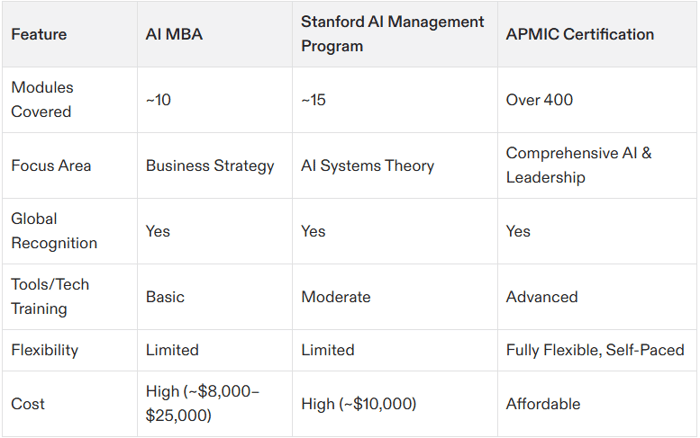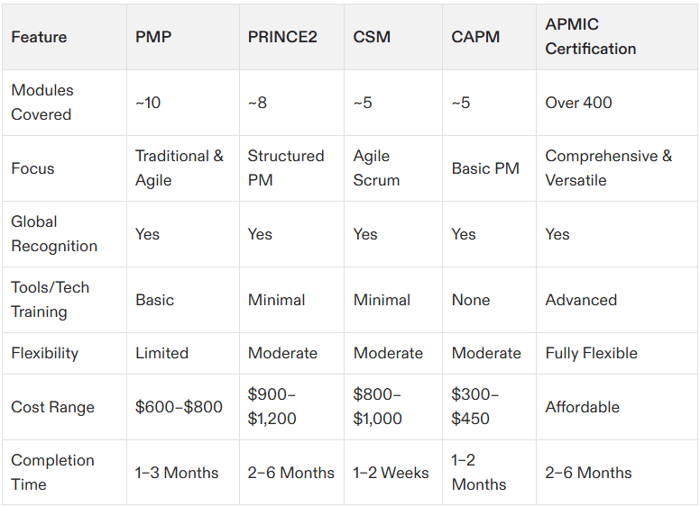Table of Contents
- The Rising Demand for Project Management Professionals in 2025
- Why the University of Washington's Project Management Certification Stands Out
- Elevate Your Expertise: Combining UoW with Advanced Certifications
- Real-World Benefits: How Certification Transforms Your Career
- The University of Washington Project Management Certification: Addressing Common Questions
- 1. What exactly is the Project Management Certification at the University of Washington?
- 2. Is investing in this certification really worth it?
- 3. Who is the ideal candidate for this program?
- 4. Can I supplement this certification with other credentials?
- 5. How does this certification differ from something like the PMP?
- 6. What types of career paths can this certification lead to?
- 7. Does the UoW program incorporate Agile methodologies?
- 8. What kind of support can I expect during and after the course?
- Choosing the Right Path: A Certification Comparison
- Conclusion: Your Journey to Project Management Excellence Starts Now
- FAQs
Sometimes it seems like projects are launched by a caffeinated squirrel? If so, you've come to the right place. This is the ultimate guide to the Project Management Certification at the University of Washington (UoW) – the tool that will help you transform chaotic sprints into successful and smooth endeavors. We will not only explain what makes the UoW certification special, but also how it can help you advance in your career in the constantly changing world of project management in 2025. Let’s jump right in!
The Rising Demand for Project Management Professionals in 2025
Project management has grown from a specialized discipline to a critical profession that almost every organization requires. The current world business environment calls for people who can coordinate large-scale projects, track resources, and make decisions in the presence of ambiguity. They are essential in tech companies developing new software, healthcare firms implementing new programs, and advertising agencies launching new campaigns.
According to recent industry reports, the demand for project management professionals is projected to grow substantially over the next decade. This growth is fueled by increasing globalization, technological advancements, and the need for organizations to adapt quickly to changing market conditions. As projects become more complex and interconnected, the need for certified project managers who possess the knowledge, skills, and experience to deliver results has never been greater.
Why the University of Washington's Project Management Certification Stands Out
In a sea of project management programs and certifications, the Project Management Certification at the University of Washington distinguishes itself through its academic rigor, practical approach, and industry relevance. Here's a detailed look at what makes this certification a premier choice for aspiring and experienced project managers:
1. Academic Excellence and Reputation
The University of Washington consistently ranks among the top universities worldwide, recognized for its commitment to academic excellence and research. The Project Management Certification program reflects this dedication, providing students with a comprehensive curriculum grounded in the latest project management theories and best practices.
By earning this credential, professionals gain a distinct competitive advantage in the job market. The UoW name carries weight, signaling to employers that you have received a high-quality education and possess the skills necessary to succeed in project management roles.
2. Comprehensive and Current Curriculum
The UoW Project Management Certification program covers all critical aspects of project management, from initiation and planning to execution, monitoring, and closure. The curriculum is designed to provide a broad understanding of project management principles while also delving into specialized topics that are relevant to today's business environment.
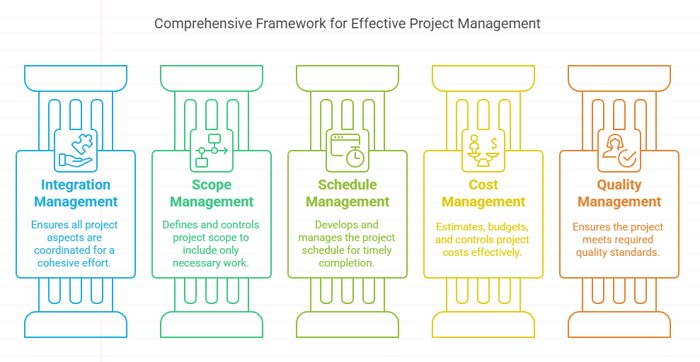
Key topics covered in the program include:
Project Integration Management: Coordinating all aspects of the project to ensure a unified and cohesive effort.
Project Scope Management: Defining and controlling the project scope to ensure that only the necessary work is included.
Project Schedule Management: Developing and managing the project schedule to ensure timely completion.
Project Cost Management: Estimating, budgeting, and controlling project costs.
Project Quality Management: Ensuring that the project meets the required quality standards.
Project Resource Management: Acquiring, managing, and leading the project team.
Project Communications Management: Developing and implementing a communication plan to keep stakeholders informed.
Project Risk Management: Identifying, assessing, and mitigating project risks.
Project Procurement Management: Acquiring goods and services from outside the organization.
Project Stakeholder Management: Identifying and managing the expectations of project stakeholders.
In addition to these core topics, the program also covers contemporary project management approaches such as Agile, Scrum, and hybrid methodologies. This ensures that graduates are well-versed in a variety of project management techniques and can adapt to the unique challenges of any project.
If you're considering a top-tier program for project management, you may also want to check out the Project Management Certification at University of Maryland, which offers a similarly prestigious certification with cutting-edge methodologies and industry relevance.
3. Emphasis on Practical Application
One of the standout features of the UoW Project Management Certification program is its emphasis on practical application. The program incorporates a variety of hands-on learning experiences, including:
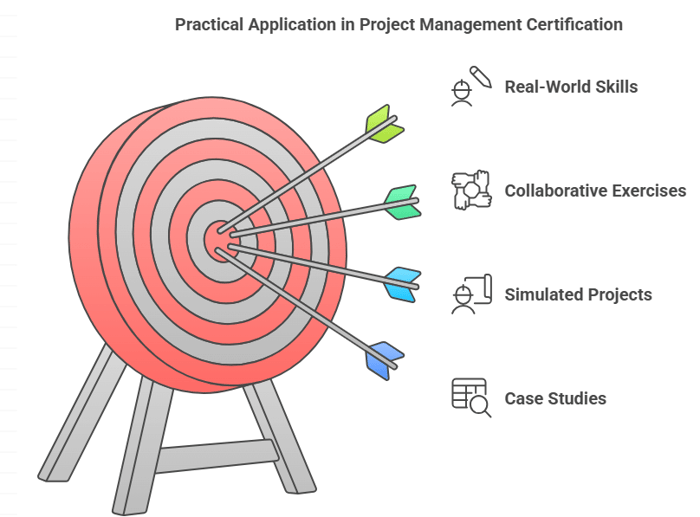
Case Studies: Analyzing real-world project scenarios to understand the challenges and opportunities that project managers face.
Simulated Projects: Working on simulated projects to apply project management principles and techniques in a realistic setting.
Collaborative Exercises: Working in teams to solve project management problems and develop collaborative skills.
These practical learning experiences allow students to translate theoretical concepts into real-world skills. Graduates of the program are not just knowledgeable about project management; they are also capable of applying what they have learned to deliver results.
4. Alignment with Industry Standards
The UoW Project Management Certification program is closely aligned with the Project Management Institute's (PMI) PMBOK (Project Management Body of Knowledge). This ensures that the program adheres to global best practices and prepares graduates for further certifications, such as the PMP (Project Management Professional).
PMI is the leading professional association for project management, and the PMBOK Guide is the definitive resource for project management principles and practices. By aligning with these standards, the UoW program ensures that graduates are well-prepared to meet the demands of the project management profession.
5. Flexible Learning Options
Recognizing the diverse needs of working professionals, the UoW Project Management Certification program offers a variety of flexible learning options, including:
Local Classes: In-person classes held at the University of Washington campus.
Online Courses: Online courses that can be accessed from anywhere in the world.
Hybrid Programs: A combination of in-person and online learning.
These flexible learning options allow professionals to balance their studies with work and personal commitments. Whether you prefer the structure of in-person classes or the convenience of online learning, the UoW program has an option that fits your needs.
6. Networking Opportunities
The UoW Project Management Certification program provides numerous networking opportunities for students to connect with experienced faculty, industry professionals, and peers. These interactions can lead to valuable mentorships, partnerships, and career opportunities.
The program also hosts guest speakers, workshops, and networking events that allow students to learn from and connect with leaders in the project management field.
Elevate Your Expertise: Combining UoW with Advanced Certifications
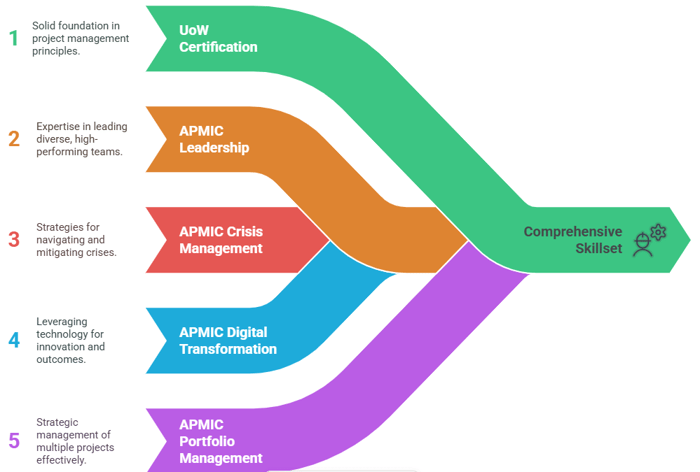
While the Project Management Certification at the University of Washington provides a solid foundation in project management, combining it with advanced certifications can take your career to the next level. One such certification is the APMIC Certification, which offers a robust curriculum with over 400 specialized modules.
The APMIC Advantage
The APMIC Certification is designed for experienced project managers who are looking to deepen their knowledge and develop specialized skills in areas such as:
Leadership Dynamics: Mastering the art of leading diverse and high-performing teams.
Crisis Management: Developing strategies to navigate unexpected challenges and mitigate their impact.
Digital Transformation: Understanding how to leverage technology to drive innovation and improve project outcomes.
Portfolio Management: Managing a collection of projects to achieve strategic objectives.
By combining the UoW Project Management Certification with the APMIC Certification, you can develop a comprehensive skillset that sets you apart from the competition. You'll not only gain a strong foundation in project management but also develop the specialized expertise needed to lead complex and strategic initiatives.
For another high-quality option, the Project Management Certification Penn State also provides excellent resources and is a great complement to certifications like UoW and APMIC.
Real-World Benefits: How Certification Transforms Your Career
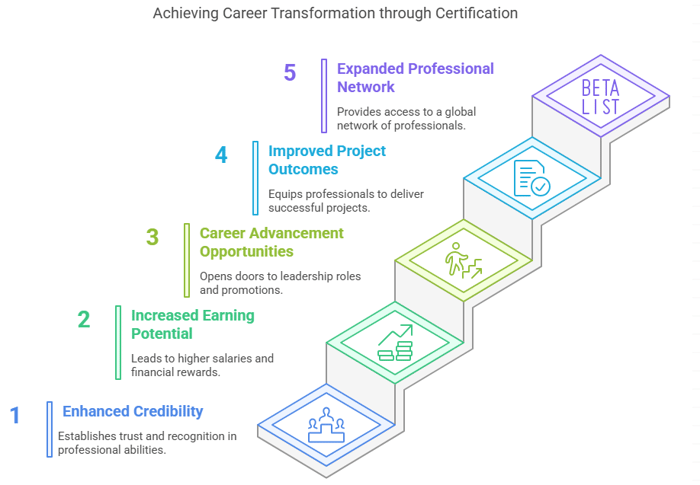
Earning the Project Management Certification at the University of Washington is more than just a piece of paper; it's a catalyst for career transformation. Here's how certification can impact your career trajectory:
Enhanced Credibility: Certification demonstrates your commitment to professional development and validates your knowledge and skills.
Increased Earning Potential: Certified project managers often command higher salaries than their non-certified counterparts.
Career Advancement Opportunities: Certification can open doors to leadership roles and other career advancement opportunities.
Improved Project Outcomes: Certified project managers are better equipped to deliver projects on time, within budget, and to the required quality standards.
Expanded Professional Network: Certification provides access to a global network of project management professionals.
The University of Washington Project Management Certification: Addressing Common Questions
To provide a clearer picture, let’s tackle some frequently asked questions about the Project Management Certification at the University of Washington:
1. What exactly is the Project Management Certification at the University of Washington?
Think of it as your comprehensive toolkit for all things project management. It's a professional development program designed to teach you the core principles and essential skills needed to manage projects successfully. The curriculum blends rigorous academic learning with real-world applications, making sure you not only understand the theory but also how to implement it effectively. You'll cover key areas like project planning, risk assessment, Agile methodologies, and stakeholder management, equipping you to confidently lead complex projects across various industries.
2. Is investing in this certification really worth it?
Absolutely! It's a strategic investment in your career. Beyond the prestige of being associated with a top-tier institution, you'll gain highly sought-after skills that can significantly boost your earning potential and open doors to leadership roles. The program's practical focus means you can immediately apply your new knowledge in the workplace, setting you apart in a competitive job market.
3. Who is the ideal candidate for this program?
This program caters to a wide range of professionals. Whether you're looking to upskill, switch careers, or refine your strategic abilities, this certification offers immense value. It's perfect for early-career professionals seeking to establish themselves, mid-level managers aiming to enhance their capabilities, and even senior leaders wanting to formalize their project oversight skills.
4. Can I supplement this certification with other credentials?
Definitely! Combining this certification with others, like the APMIC Certification, can significantly enhance your professional profile. While UoW provides a strong foundation, APMIC delves into advanced topics like leadership strategies, digital transformation, and crisis resolution. This combination ensures you possess both the broad knowledge and the specialized expertise needed to excel in high-stakes environments.
5. How does this certification differ from something like the PMP?
The UoW certification distinguishes itself through its balanced approach, integrating academic learning with hands-on project experience. You'll gain a broad understanding of project management fundamentals across various methodologies, including both traditional and Agile frameworks. In contrast, the PMP certification focuses heavily on traditional techniques and requires significant prior project management experience. While the UoW program builds a solid foundation, the PMP validates existing knowledge and offers global recognition. Ideally, they complement each other perfectly!
6. What types of career paths can this certification lead to?
A world of opportunities awaits! Graduates can pursue roles such as Project Manager, Program Manager, Project Coordinator, Project Analyst, and more. The skills you acquire—like planning, execution, risk management, and stakeholder engagement—are highly transferable across industries, including IT, healthcare, construction, and marketing. This certification enhances your marketability and opens doors to leadership positions.
7. Does the UoW program incorporate Agile methodologies?
Absolutely! The program integrates Agile principles and practices throughout the curriculum. You'll learn about frameworks like Scrum, Kanban, and Lean, and how to apply them in different project contexts. The focus is on iterative development, adaptive planning, and continuous improvement, equipping you to thrive in fast-paced and dynamic environments.
8. What kind of support can I expect during and after the course?
The University of Washington is committed to your success! You'll have access to experienced instructors for guidance and mentorship, as well as resources like study groups, online forums, and tutoring services. After completing the course, you'll gain access to alumni networks and career services to support your job search and professional growth. Plus, the program offers ongoing learning opportunities to keep you updated on the latest project management trends.
Choosing the Right Path: A Certification Comparison
To help you make an informed decision, here’s a comparison table of some popular project management certifications:
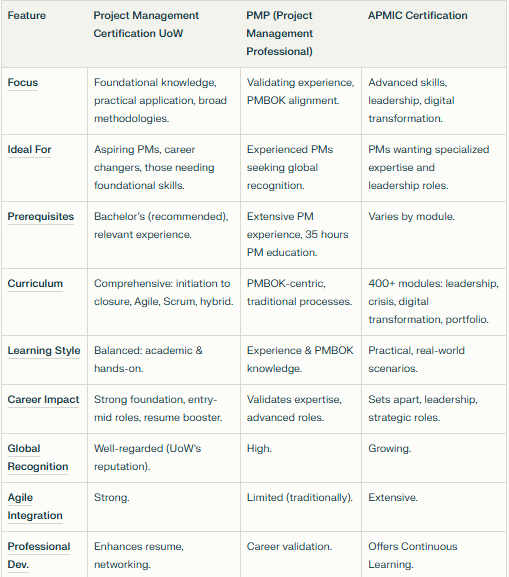
Unveiling 10 Surprising Facts About Project Management in 2025
AI Co-Pilots:
AI is no longer just automating tasks; it's acting as a co-pilot, providing real-time insights and recommendations to project managers, helping them make more informed decisions.
(Source: Wikipedia - Artificial Intelligence)The Rise of the Gig PM:
More companies are tapping into the gig economy for specialized project management skills, hiring freelance PMs for specific projects or phases.Sustainability as a KPI:
Environmental sustainability is becoming a key performance indicator (KPI) for projects, with companies prioritizing eco-friendly practices and measuring their impact.
(Source: U.S. Environmental Protection Agency - Sustainability)Remote Collaboration Tech:
Advanced collaboration tools are blurring the lines between physical and virtual teams, enabling seamless communication and knowledge sharing across geographic boundaries.
(Source: Wikipedia - Virtual Collaboration)Data-Driven Storytelling:
Project managers are using data visualization and storytelling techniques to communicate project progress and insights to stakeholders in a more engaging and understandable way.
(Source: Wikipedia - Data Visualization)Emotional Intelligence Matters More:
As teams become more diverse and distributed, emotional intelligence (EQ) is increasingly valued as a critical skill for project managers.
(Source: Wikipedia - Emotional Intelligence)Micro-Certifications:
The trend towards micro-certifications is growing, allowing project managers to demonstrate expertise in specific niche areas and stay ahead of the curve.
(Source: Wikipedia - Microcredential)The Metaverse for Project Planning:
Some innovative companies are experimenting with using the metaverse for project planning and collaboration, creating immersive virtual environments for brainstorming and decision-making.
(Source: Wikipedia - Metaverse)Emphasis on Continuous Learning:
Project managers are expected to be lifelong learners, constantly updating their skills and knowledge to adapt to the ever-changing project landscape.
(Source: U.S. Department of Labor - Training and Development)Blockchain for Project Funding:
Blockchain technology is being used to streamline project funding and ensure transparency, particularly in large-scale infrastructure projects.
(Source: Wikipedia - Blockchain)
Conclusion: Your Journey to Project Management Excellence Starts Now
The Project Management Certification at the University of Washington provides a unique blend of academic rigor, practical experience, and industry relevance that can propel your career to new heights. By combining this certification with advanced programs like the APMIC Certification, you'll unlock even greater potential to lead and innovate in today's dynamic business environment.
And remember, if you're aiming to conquer the PMP exam, don't miss out on our top-notch PMP Certification Prep Course at APMIC. It's your secret weapon for PMP success!
FAQs
How much does the Project Management Certification cost at the University of Washington?
The cost can vary; it’s best to check the UoW's official website for the most current tuition fees and any associated costs.
How long does it take to complete the Project Management Certification?
The duration typically depends on the program format (online, in-person, hybrid) and intensity, ranging from a few months to a year.
Are there any prerequisites for enrolling in the program?
While specific prerequisites may vary, a bachelor's degree or equivalent professional experience is often recommended.
Is the Project Management Certification at UoW recognized internationally?
Yes, given UoW's global reputation, the certification is well-regarded internationally, enhancing global career prospects
Does the program offer career placement assistance?
UoW often provides career services, including job postings, career counseling, and networking events, to support graduates in their job search.
Can I use the UoW certification to prepare for the PMP exam?
Yes, the program's content is aligned with PMBOK, making it an excellent foundation for PMP exam preparation.



